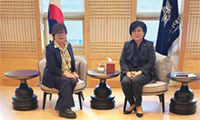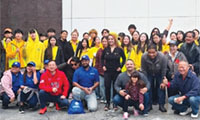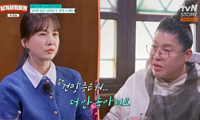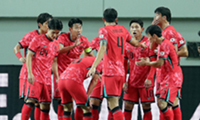I AM AN AMERICAN in pursuit of life, liberty and happiness
I am an adult. I am an American. I do not look American. I have strange eyes. Or rather the eyelids are different. Hooded, almost reptilian, hence odd looking. And the color of my face is wrong. At school there was a box to mark: White, Brown, Yellow, Black and Red. Teacher tells me to mark the Yellow. The others mark White. No one marks Black or Red. There is no Negro or Indian student. I am the one different. But ...
I can vote. I am American. I am 21 years old. And do not vote. I do not feel American. When I do cast a vote I am 28 years of age, living in an American household. Here I am the cook, maid, driver, and jack-of-all-trades (and master of none). My employer is American. Her ancestors came to America as immigrants, like my parents. She is third generation born. She married wealth and is listed in the social register Blue Book. The Great Depression ruins the country’s wealth. She blames "That Terrible Man in the White House" who betrayed their Class. The Republican candidate will restore the country to normalcy, to real Americans. There’s a rabble growing out there on the streets. (Strikes, she means. Sometimes we talk one-to-one like this. She is a Stanford graduate from long ago when higher education for women was usually frowned upon. I admire her and listen.) She tells me it is sensible for me to vote Republican. I do. My vote, I know, will make no difference. Whether Class Wins Out or That Terrible Man in the White House Continues to Betray ...
Because the conflict in Europe is joined by the United States. It is a terrible war. The conflagration spreading, millions will die before it is over. My brothers become soldiers, and perhaps for the first time they are told they are American. For them to mark the box for Race (color), "White." Americans are fighting the Japanese, and our soldiers are not to be mistaken for the enemy. My employer’s son is made a captain and assigned to oversee the production of military supplies manufactured by a huge munitions plant in the Midwest. The war over, he returns home to find the family wealth restored, and he is a millionaire. His mother’s divorce settlement is paid, and she too is wealthy. America is the stuff dreams are made of. Somewhere, I know is my dream waiting to be fulfilled. I leave my employer to do my share in the war effort.
My father is ahead of me. He is 70. He is doing, of all things, vacuuming Main Street movie houses after the last midnight showing, earning money to buy U.S. War Bonds. I ask did he feel more American although denied citizenship, or what. He says no, he is buying ammunition for his sons to defend themselves with. Another way to look at war. It is original. My contribution is small. It is editing the English page of The New Korea. The few qualified writers have left to do their share in the war effort too. They translate for the OSS (Office of Strategic Services) and OWI (Office of War Information) in the Korean language, also Japanese or Chinese. I move out of the kitchen into the parlor. My former employer invites me to lunch. She has moved into an elegant new apartment on Beverly Boulevard, near the Los Angeles Country Club. The housekeeper has taken the day off, to attend church. It is Sunday. So we serve ourselve from a buffet, sitting down to a tasty lunch, happy we are not churchgoers today. She asks about the newspaper, what it is I do, since she knows I do not read, write, or speak Korean. That is a problem I do not fail to wonder about and never resolve for myself. Cousin JK Dunn who has placed me in the editorial position tells me to 1) Do your best 2) Cautions "A slip of the lip sinks ships" 3) Write and fill the weekly columns.
I am overpaid, I tell my hostess, for what I give in return. Koreans do not like the limelight, their friends will criticize them. So news is hard to report. She understands, she is the vice president of a national organization and shies away from publicity. I cover one item of near-significance. The Catholic Bishop of China is in the country from Chungking (the government’s temporary capital). The UKC office made great effort to get an interview for our paper here; he is touring America. The other Korean paper, Independence, is covering the story too. The Independence is said to be communist-oriented. The term might have been used to denigrate the Koreans supporting the paper. The group broke away from Korean National Association, and walked out of a meeting. Koreans don’t cooperate, I tell my hostess. She knows about cooperation. Americans know Roberts Rules of Order and work for consensus. But, I tell her, it is the Chinese bishop who doesn’t cooperate. He is two hours late, greets us long enough to tell he has no time for an interview, he is on his way to an important meeting. I write up the interview as it happened: it is not newsworthy. Also I do not report about the haraboji who came into the office. His name is Huck Yoon. My brothers often mentioned his name so I am glad to see him. Says he brightly, sounding off my brothers names: "You have five brothers! Lots of insurance! They killed in war, you rich!" That is Korean frankness. They speak their minds. They are greedy, too, even if it’s only for me.
One of my hostess’s friends was Charlene. She often came to dinner and we became friends. So her name comes up when I think of my employer. Charlene was a student of the Bible. That statement takes explaining. Unless a person is entering the ministry or connected with a religious order he or she is not studying in the religious sense. But Southern California, in its early years of real estate development, was also the center for religious and spiritual seekers. It also attracted crackpots ridiculed in the movies and articles of Los Angeles. There were serious seekers. One was Krishnamurti brought as a young person by his sponsor and devotee to Ojai. She claimed he was the Second Coming of Christ. He denied the role but remained and was a well-known spiritual adviser in Ojai. Ellen Sanford White, founder of the Seventh-day Adventist church, was another who came to California and settled in the San Gabriel Valley. Aimee Semple MacPherson founded her church in Los Angeles and probably was the most famous evangelist, attracting worshipers for her "good works", feeding, clothing, and sheltering the Great Depression homeless. So, with this background in mind, it is no surprise Charlene was studying the Bible.
Of her early life, she said, it was haphazardly managed. Her father died when she was a baby. Her mother was mentally ill and lived in their home, nurses attending her. Governesses were her school teachers and the kitchen was the classroom. It was the cheeriest place in the house. There was no entertaining. However, Charlene’s name was in the social register Blue Book and was invited everywhere. She was a member of the wild crowd that partied at the downtown Alexandria Hotel. Soon she was the leader. It was an absinthe-drinking lost generation, getting high on the prohibited French liqueur, disapproved as decadent. She was briefly engaged, breaking off with the young man before he was brokenhearted. He sailed away for the South Seas and became famous. He wrote bestsellers. She was off on her own. Her mother died. Her grandfather, who founded the family fortune in the dry goods business, retired, built the Christian Church on Pico Boulevard (today it serves a Black congregation), and preached Sundays until his death. Charlene was left the texts of his sermons, notes, and his Bible. With this legacy, she retired into her life work. Of her then, my hostess said, "She was a lonely figure." Charlene said she had never been better occupied, she was never lonely. She did not become a churchgoing Christian. Nor did she affiliate with any particular doctrine. The Bible was the guide to learning what she did not know. One time she was blocked. I believe it was a philosophical question that no philosopher had puzzled out. She turned to the philosophy department at UCLA, whose dean was a Dr. Boodine. He was soon to retire and welcomed the question. They met and he approved the work she was doing. Until he died, he freely advised her. Was her seeking successful? I think so. I use the Serenity Prayer for measurement. She puts the prayer in action. Accepting what she could not change and changing what she could (of her life). Most of us never learn it is our self only we can change. Nothing more.
* * *
My brothers come home from war. Working is no longer a chore after soldiering for four years. They take the civil service exams and pass and join another kind of army. Army of government workers and it is their stamp of approval they are American. I am heartened. I have so long wanted to be really American. The Korean paper, because it was in English, almost said I was an American. Since I can type I take the test for clerk-typist, at the lowest grade level. I pass the two tests, barely, typing and the intelligence. The examiners ask a few questions on the oral, about my work record and the reason I want to work for the city. Then one pops up with, "Why aren’t you married by now?" I am 38. The others scramble to look at my application, then at me. Comes the stereotypical question from a stereotypical American. I am not American. I am different, even odd: an old maid. But I am not a stereotype and one day I know I will be what I want to be: A Real American! (Here I will let you know what I did become: a human being and almost a would-be-professional writer! and that’s much better, I tell you smugly today, having reached the age of wisdom, knowing that I know nothing.)
Happily, Hazel Kim, who is now Mrs. "Yobo" Younghee Kim, comes home from the war too. She wrote for the Honolulu Advertiser and was night editor for United Press. Right after Pearl Harbor there was a shortage of readers in the censorship bureau and she was drafted. The only interesting thing that happened there, she said, was sitting next to Ernest Hemingway’s first wife, clipping words from people’s mail. She went back to the newspaper work, and when her husband was released from the army, they came to Los Angeles. Here, she said, they planned to make a home and have a family. Yobo died before the baby was born. He was diagnosed cancer and died four months later. Mother and baby moved in with her parents.
Hazel and Yobo had made poor business investments. One was in a plastic peashooter factory. Children were clamoring for peashooters. There was a government ban on the production when children were swallowing the plastic pellet that lodged in their lungs.
Kathy, the baby’s name, had the luck of being spoiled by grandparents, and did not have to learn to read, write or speak Korean, Hazel, who I thought typically American, could do all three. Then, she was clever and intelligent and learned everything with no difficulty. Only one thing. The home was in the USC neighborhood, and fast growing into a Black community. Suddenly Hazel, who had not recognized race as a factor of Los Angeles life, was aware her daughter had Black playmates, preferred them to the few Koreans living there, and spent more time with the next door Black family than at home. Her mother said not to worry, time would take care of the situation. Children grew into teenagers and adults and made up their own minds. Hazel did not listen and packed herself and Kathy to Honolulu, where Yobo’s family lived comfortably from an income managing a store. She was welcomed by his family, reminded that Korean families were the center of their social structure. From the person I had considered so American, I watched her grow more and more into the Korean family - her parents’ friends, her brothers and sister, the many nieces and nephews whom Kathy did not prefer to her neighbors who were closer.
Hazel did not write her book, as she planned. Kathy went on to the university, graduated summa cum laude, and suffered a breakdown. I kept in touch with Hazel and Kathy, until Hazel’s death. I cannot feel she died, she was such an alive person. Kathy, when I last talked with her, said she had washed and ironed her mother’s clothes, ready for her to put on when she returned. I understood what Kathy meant. Hazel is not dead, she lives in Kathy’s heart. Love never dies in the heart.
Somewhere in this span of time with Hazel in Honolulu, and I here in Los Angeles, getting to be American got lost between the cracks in my life. Strangely, the seeking for Americanism came full circle. It was a search for my self, and I was always what I was meant to be. Exactly.
War’s end also brought Pat Dunn back into my life. She finished high school a month after her father’s death (Jacob Dunn). She was given a scholarship to Mills College in California. When she went over to Mills to inquire about the scholarship, she was told it was available to her, but for the first year she must live on campus in dormitories. The cost was 2500 dollars. Her father’s death in the military transport was in question regarding insurance payment. Pat told her mother the rule about campus living and the cost. Would she pay or lend the money? Her mother’s answer was typical of Mary, "Girl, I work for my money. You do the same." In a resume required later for college entrance, Pat wrote she decided to take more ballet lessons and went to the San Francisco Opera ballet classes and worked at Gumps. She came to Los Angeles and studied dancing with Eugene Loring, and joined Jack Cole’s dancers, one of whom was Gwen Verdon. Pat was a serious dancer, unlike the dilettantism that affected the family generally. In 1953 she appeared in the first showing of "Kismet" at the Biltmore Theater. Hazel, my sister Elizabeth, and I sat in choice orchestra seats, our attention riveted on young Pat and her success. What an achievement! She had made it. Not only as a dancer but she was American to the core of her being. She never understood my question, "Do you feel American?" She married an American. He was a lawyer. A successful one, too. Pat retired after years with Jerome Robbins ballet and followed her heart’s desire. To get an education. A Ph.D. preferably. She almost made the doctorate. She died before she completed writing her dissertation, but had passed her orals. I thought of her as the first American our family had produced. It took time (she died 1990) from the first immigrants who came in 1904. She was born in 1929. Pat was the best - she had a sense of humor. She had heart, she helped many of us who would not make it otherwise.
* * *
I need to conclude this sketch with the Fair Employment Practice Act. It was not practiced much until the racial question loomed large after the war. It had not come to my attention and I did not know it existed. In 1953 a former student from my high school days phoned to ask if I would be interested in a job where he worked. He did not have to sell me. I knew where he worked, what the pay was, including benefits like health insurance, pension at retirement, etc. The company was anti-union so the pay was better than the current wage scheme. And I was getting older with little chance of Prince Charming riding up on his steed. The interview with the supervisor went well. He actually welcomed me, saying after his sales talk (as if I had need of one), "There are only two tests ahead of you. Physical and intelligence. You will pass both. You have only to breathe and be warm, like the army test. The intelligence test, no sweat. You show intelligence applying. See you Monday morning."
That Monday morning was like starting first day at school. It was heavenly. It was divine. I’d never again have to come down to earth to live. In fact I am an American. Everybody in the department are white folks - I am the one who is different but no one notices. They are polite. My friend, of course, paved the way and he seems very proud. I do him proud, he says. What more can I ask of Life?
The answer comes. I learn in time it is the Fair Employment Practice Act that has found me the job. The white workers did not want Blacks or people like that. My friend tells he has a Korean friend who might do. The white workers say I will do. So I am hired. I am only a little hurt. Repetition has enured me. Then I marry one of the workers. He is an American and I do not wish to marry him, I want independence. The ancient Greeks said, "Whom the gods destroy, they first drive mad." That’s the only reason for the marriage. So I lost being American, and shrunk smaller and smaller, like in Alice’s adventures by Lewis Carroll, I use metaphors and fairy tales to describe the indescribable. A whimsical lawyer explained it this way of the marriage. "You’re a couple of scorpions in a tight-squeeze bottle and can’t get at each other to sting." Maybe we merit each other. Karmically speaking.
One thing we had in common, our parents were immigrants. His from Europe, mine from Korea.
스마터리빙
more [ 건강]
[ 건강]이제 혈관 건강도 챙기자!
[현대해운]우리 눈에 보이지 않기 때문에 혈관 건강을 챙기는 것은 결코 쉽지 않은데요. 여러분은 혈관 건강을 유지하기 위해 어떤 노력을 하시나요?
 [ 건강]
[ 건강]내 몸이 건강해지는 과일궁합
 [ 라이프]
[ 라이프]벌레야 물럿거라! 천연 해충제 만들기
 [ 건강]
[ 건강]혈압 낮추는데 좋은 식품
[현대해운]혈관 건강은 주로 노화가 진행되면서 지켜야 할 문제라고 인식되어 왔습니다. 최근 생활 패턴과 식생활의 변화로 혈관의 노화 진행이 빨라지고
사람·사람들
more
“한국어 교육 확산 협력”
한국어진흥재단(이사장 모니카 류)이 숙명여대(총장 문시연)와 한국어 교육 확산을 위한 협력에 나선다. 한국어진흥재단의 모니카 류 이사장은 지난…

KYCC·VWKC·주민의회 등 합동 타운 대청소 성료
한인타운청소년회관(KYCC)과 헤더 허트 시의원(LA 10지구) 사무실, 그리고 행사에는 윌셔 한인타운 커뮤니티 목소리(VWKC), 내셔널 유…
ROTC 남가주 동지회 골프 모임
ROTC 남가주 동지회(회장 이창훈)는 지난 22일 라미라다 골프코스에서 골프 모임을 열었다. 이날 행사에는 30여 명이 참석해 라운딩을 함께…
외대 동문회 정기이사회… 전정구 차기회장 선출
한국외국어대학교 남가주동문회(회장 서상희, 이사장 진 권)는 지난 21일 신북경에서 제2차 이사회를 개최하고 전정구 동문(77학번 스페인어과)…
[송년행사 게시판] 중앙중고 교우회 外
■ 중앙중고 교우회남가주 중앙 중·고등학교 교우회가 오는 12월13일(토) 오후 5시 놀웍에 위치한 더블트리 바이 힐튼 호텔(13111 Syc…
많이 본 기사
- 프리웨이서 타이어 날아와 한인 운전자 사망 ‘날벼락’
- 홍콩 초고층 아파트 단지 최악 화재 대참사… 320여명 사망·실종
- 백악관 앞 총격전… 주방위군 피격
- 백악관 앞 총격범 아프간 군인 출신…미군 협력자로 4년전 입국
- 트럼프 “백악관 인근 군인총격은 테러행위”…反이민 강화 예고
- 트럼프 대선뒤집기 혐의 공소 ‘기각’
- “선생님과 인연 없는 배우 있겠나”…이틀째 故이순재 조문 행렬
- 캘리포니아 ‘햄버거·피자도 가장 비싼 주’
- 홍명보호 ‘포트2(2026 북중미 월드컵)’ 확정… ‘죽음의 조’를 피하라
- 백악관 대변인 가족도 이민 단속에 체포돼
- 아시안이라고 총으로 얼굴 폭행까지
- LA 카운티 산불 및 이민단속 피해자들 대상… 주거비 1만5천불까지 지원 개시
- 레이커스, 시즌 첫 LA 더비서 클리퍼스 제압
- 18개주 100여개… H마트 전국 매장 확대 ‘박차’
- 워싱턴주 최대 지자체 첫 한인 의원 취임
- 추수감사절 연휴 대이동… 꽉 막힌 프리웨이
- ‘기적의 주사?’… 펩타이드 열풍 뒤에 가려진 위험성
- 우주로 치솟는 누리호 야간에 4차 발사 성공
- 보스턴, 125승 투수 그레이 영입 에이스 크로셰와 ‘원투 펀치’
- “미 특사가 러 입장에 동조”… 통화 공개 파장
- 전국 고용 12만명 증가… 예상치 상회
- 2025년 리테일 NNN 투자 흐름
- 교황, 첫 해외 순방길 튀르키예·레바논 6일간
- ‘첫 여성 유엔 총장’ 기대감
- 실업수당 청구, 2개월래 최저
- LA 교육원, 외국어교육 연례 컨퍼런스 참가
- 아이폰17 판매 돌풍 애플, 삼성 넘고 1위
- 한·일 등 아시아 동맹, 관세 폐지법안 발의
- 미 경제 ‘K자 양극화’… 소득계층 소비 격차 확대
- [커뮤니티 게시판] 크리스마스 영화 상영 29일 주님의영광교회 外
- “연방정부가 이젠 기업들 주요 주주로”
- 맘다니 인수위에 한인 3명 포진
- 보험에서 생활비와 부동산 복구비 지불
- [전문가 칼럼] 건강한 혈관과 깨끗한 혈관
- 종전안 합의 임박?… 엇갈린 전망
- 자카르타 1위 등극… 인구 4,200만 명
- 한인업소, 추수감사절에도 정상 영업
- 외대 동문회 정기이사회… 전정구 차기회장 선출
- [조재성 박사의 두 도시 이야기] 코리아타운, 불완전함의 아름다움
- “12월 금리인하 지지” 샌프란 연은총재 밝혀
- 통합케어 ‘K-day PACE’… 한인 시니어에 인기
- [어메이징 냉난방] 경동 나비엔, 12월까지 리베이트 혜택
- [우미노시즈쿠] “미 면역학회 효능 인정… 고객 감사 기념 프로모션”
- [써니랜드 아키텍츠] “발코니 의무검사, 지금이 골든타임”
- 뱅크오브호프, 하와이주서 뜻깊은 장학금 수여
- 리버스 모기지 관심 다시 증가세… 이제는 안전한가?
- [여명] 천재 한 명이 만 명을 먹여 살린다
- 백악관 코앞서 군인 2명 총격 중태…추수감사절 전날 美 충격
- [김재천 칼럼] 경제로 안보를 사는 시대
- [지평선] ‘피지컬 몽골’의 그늘
1/5지식톡

-
 테슬라 자동차 시트커버 장착
0
테슬라 자동차 시트커버 장착
0테슬라 시트커버, 사놓고 아직 못 씌우셨죠?장착이 생각보다 쉽지 않습니다.20년 경력 전문가에게 맡기세요 — 깔끔하고 딱 맞게 장착해드립니다!장착비용:앞좌석: $40뒷좌석: $60앞·뒷좌석 …
-
 식당용 부탄가스
0
식당용 부탄가스
0식당용 부탄가스 홀세일 합니다 로스앤젤레스 다운타운 픽업 가능 안녕 하세요?강아지 & 고양이 모든 애완동물 / 반려동물 식품 & 모든 애완동물/반려동물 관련 제품들 전문적으로 홀세일/취급하는 회사 입니다 100% …
-
 ACSL 국제 컴퓨터 과학 대회, …
0
ACSL 국제 컴퓨터 과학 대회, …
0웹사이트 : www.eduspot.co.kr 카카오톡 상담하기 : https://pf.kakao.com/_BEQWxb블로그 : https://blog.naver.com/eduspotmain안녕하세요, 에듀스팟입니다…
-
 바디프렌드 안마의자 창고 리퍼브 세…
0
바디프렌드 안마의자 창고 리퍼브 세…
0거의 새제품급 리퍼브 안마의자 대방출 한다고 합니다!8월 23일(토)…24일(일) 단 이틀!특가 판매가Famille: $500 ~ $1,000Falcon: $1,500 ~ $2,500픽업 & 배송직접 픽업 가능LA…
-
 바디프렌드 안마의자 창고 리퍼브 세…
0
바디프렌드 안마의자 창고 리퍼브 세…
0거의 새제품급 리퍼브 안마의자 대방출 한다고 합니다!8월 23일(토)…24일(일) 단 이틀!특가 판매가Famille: $500 ~ $1,000Falcon: $1,500 ~ $2,500픽업 & 배송직접 픽업 가능LA…
케이타운 1번가
오피니언
 조재성 LA 포럼 회장·도시비평가
조재성 LA 포럼 회장·도시비평가 [조재성 박사의 두 도시 이야기] 코리아타운, 불완전함의 아름다움
 김재천 서강대 국제대학원 교수
김재천 서강대 국제대학원 교수 [김재천 칼럼] 경제로 안보를 사는 시대
 정민정 서울경제 국제부장
정민정 서울경제 국제부장 [여명] 천재 한 명이 만 명을 먹여 살린다
 허경옥 수필가
허경옥 수필가 [윌셔에서] 조용한 명절
 최문선 / 한국일보 논설위원
최문선 / 한국일보 논설위원[지평선] ‘피지컬 몽골’의 그늘

[왈가 왈부] 민주당 ‘1인1표제’ 내홍… 정치 극단화는 경계해야죠
 정숙희 논설위원
정숙희 논설위원‘조금만 도와주는 일’의 아름다움
 파리드 자카리아 워싱턴포스트 칼럼니스트 / CNN ‘GPS’ 호스트
파리드 자카리아 워싱턴포스트 칼럼니스트 / CNN ‘GPS’ 호스트 미국, 실패한 우크라이나 정책으로 회귀
 김동찬 시민참여센터 대표
김동찬 시민참여센터 대표 [미국은 지금] 2025년 추수감사절의 그림자
1/3지사별 뉴스

정혜선한국전통예술원 ‘아리랑-동방의 울림’공연 성황
정혜선한국전통예술원의 특별공연 ‘아리랑-동방의 울림’(Arirang-Echoes of the East)이 지난 23일 전석 매진속에 뉴저지 포…
오바마케어 보조금 2년 더 연장되나

한인 2세‘발목’선천적 복수국적법 개정 빛 보인다
한인 2세들의 발목을 잡고 있는 선천적 복수국적법 문제 해결을 위한 ‘국적자동상실제’ 도입의 물꼬가 트일 전망이다. 지난 21일 국회의원회관…
“K-음식과 문화 함께 버무렸다”

제 5 대 정경애 회장 당선
오클랜드 & 이스트베이 한인회(이하 이스트베이 한인회)는 제 5 대 회장에 정경애 현 회장이 연임으로 공식 당선됐다고 22 일 밝혔다. 이번 …
성희준의 베이지역 풋볼(2025시즌 제12주)

오늘 하루 이 창 열지 않음 닫기 


















































.png)


댓글 안에 당신의 성숙함도 담아 주세요.
'오늘의 한마디'는 기사에 대하여 자신의 생각을 말하고 남의 생각을 들으며 서로 다양한 의견을 나누는 공간입니다. 그러나 간혹 불건전한 내용을 올리시는 분들이 계셔서 건전한 인터넷문화 정착을 위해 아래와 같은 운영원칙을 적용합니다.
자체 모니터링을 통해 아래에 해당하는 내용이 포함된 댓글이 발견되면 예고없이 삭제 조치를 하겠습니다.
불건전한 댓글을 올리거나, 이름에 비속어 및 상대방의 불쾌감을 주는 단어를 사용, 유명인 또는 특정 일반인을 사칭하는 경우 이용에 대한 차단 제재를 받을 수 있습니다. 차단될 경우, 일주일간 댓글을 달수 없게 됩니다.
명예훼손, 개인정보 유출, 욕설 등 법률에 위반되는 댓글은 관계 법령에 의거 민형사상 처벌을 받을 수 있으니 이용에 주의를 부탁드립니다.
Close
x